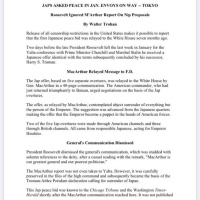いよいよレガシーの廃棄か。
製造業の化石ソフトを使い続ける中小企業はどうすれば。成長の壁かもしれません。レガシーの廃棄、先立つ物。。が資金。
Microsoft’s Next OS is Based on Linux, Not Windows
Microsoft announced a new operating system for IoT called Azure Sphere OS. But here’s the shocker: It’s based on Linux, not on Windows.
I’ll pause a moment while you let that one sink in.
Ready? OK. Here’s the story.
During a live security briefing webcast today, Microsoft announced an end-to-end Internet of Things (IoT) solution that pairs its Azure-based cloud services with IoT devices.
“Of course we are the Windows company,” Microsoft’s Brad Smith said during the webcast while holding up a tiny IoT-optimized micro-controller unit (MCU) chip. “But what we’ve recognized is, the best solution for a computer of this size—in a toy—is not a full-blown version of Windows. It is what we are creating here.”
And what Microsoft is creating here is Azure Sphere OS, a new operating system aimed at tiny MCU-based IoT devices that is based on Linux.
“It is a custom Linux kernel complemented by the kinds of advances that we have created in Windows itself,” Smith continued. “For anyone who has been following Microsoft, I’m sure you’ll recognize that, after 43 years, this is the first day that we’re announcing that we’ll be distributing a custom Linux kernel. It’s an important step for us. It’s an important step, I think, for the industry. And it will enable us to stand behind the technology in a way I believe the world needs.”
To that last bit, Smith is referring to the 10-year support lifecycle for Azure Sphere OS, which of course matches the support lifecycle for Microsoft’s enterprise offerings.
Since this was a security webcast, you might be wondering what role security plays in all this. As it turns out, security is the third piece, after the Azure cloud and the Azure Sphere OS, in this puzzle. And Microsoft has created a new Azure Sphere Security Service that it says will guard every Azure Sphere device, securely broker device-to-device and device-to-cloud communications, detect emerging threats, and renew itself as needed.
TCより 全文はこちら
『ということは、それらのデバイスではWindowsが動くのだろうか? いや、違う。Microsoftはこのプロダクトで初めて、独自のLinuxカーネルとディストリビューションを立ち上げる。そのAzure Sphere OSと呼ばれるオペレーティングシステムは、今日のMCUsの多くが使っているリアルタイムオペレーティングシステムの、Microsoft独自のアップデートだ。
Windowsのエンタープライズとセキュリティのためのパートナー担当部長Rob Leffertsは、今日の記者発表でこう述べた: “Azure SphereでMicrosoftはまったく新しい種類のIoTデバイス、すなわちMCUに対応する。Windows IoTはMCUの少なくとも100倍のパワーのあるマイクロプロセッサーユニット(microprocessor units, MPUs)〔通常のCPU〕の上で動くが、Azure Sphere IoT OSに使われているMicrosoftがセキュリティを強化したLinuxカーネルでは、OSSのライセンスのもとにチップレベルのパートナーたちが迅速に新しいイノベーションを実現できる”。
そしてそれらのパートナーたちも、オープンソースのリリースを自分たちの製品に組み込めるので、とても気が楽である。
このプロジェクトで最初にスタートを切るのが。MediaTekの一連のMCU新製品群だ。これらは、低電力消費シングルコアのARM-A7システムで、スピードは500MHz、Wi-Fi接続機能と、そのほかいくつかのI/Oオプションを備える。
オープンなエコシステム、という点では、Smithによると、それらのデバイスはAWSやAlibaba Cloudなど、そのほかのどんなクラウドの上で動くサービスからも使用できる。
実はAmazonのAWSも昨年のre:Inventデベロッパーカンファレンスで類似のプロジェクトを発表している。デバイスが特定のクラウドに縛られず、しかしクラウドサービスと組み合わさってこそ真価を発揮するのだから、これら大手のクラウドプロバイダーたちがMCUsに関心を寄せるのも当然だ。たとえば新しいデバイスの認証や、オペレーティングシステムのアップデート、それらデバイス上で動くソフトウェアの管理、などでAzure以外のクラウドが利用されることを、彼らは期待するだろう。』
製造業の化石ソフトを使い続ける中小企業はどうすれば。成長の壁かもしれません。レガシーの廃棄、先立つ物。。が資金。
Microsoft’s Next OS is Based on Linux, Not Windows
Microsoft announced a new operating system for IoT called Azure Sphere OS. But here’s the shocker: It’s based on Linux, not on Windows.
I’ll pause a moment while you let that one sink in.
Ready? OK. Here’s the story.
During a live security briefing webcast today, Microsoft announced an end-to-end Internet of Things (IoT) solution that pairs its Azure-based cloud services with IoT devices.
“Of course we are the Windows company,” Microsoft’s Brad Smith said during the webcast while holding up a tiny IoT-optimized micro-controller unit (MCU) chip. “But what we’ve recognized is, the best solution for a computer of this size—in a toy—is not a full-blown version of Windows. It is what we are creating here.”
And what Microsoft is creating here is Azure Sphere OS, a new operating system aimed at tiny MCU-based IoT devices that is based on Linux.
“It is a custom Linux kernel complemented by the kinds of advances that we have created in Windows itself,” Smith continued. “For anyone who has been following Microsoft, I’m sure you’ll recognize that, after 43 years, this is the first day that we’re announcing that we’ll be distributing a custom Linux kernel. It’s an important step for us. It’s an important step, I think, for the industry. And it will enable us to stand behind the technology in a way I believe the world needs.”
To that last bit, Smith is referring to the 10-year support lifecycle for Azure Sphere OS, which of course matches the support lifecycle for Microsoft’s enterprise offerings.
Since this was a security webcast, you might be wondering what role security plays in all this. As it turns out, security is the third piece, after the Azure cloud and the Azure Sphere OS, in this puzzle. And Microsoft has created a new Azure Sphere Security Service that it says will guard every Azure Sphere device, securely broker device-to-device and device-to-cloud communications, detect emerging threats, and renew itself as needed.
TCより 全文はこちら
『ということは、それらのデバイスではWindowsが動くのだろうか? いや、違う。Microsoftはこのプロダクトで初めて、独自のLinuxカーネルとディストリビューションを立ち上げる。そのAzure Sphere OSと呼ばれるオペレーティングシステムは、今日のMCUsの多くが使っているリアルタイムオペレーティングシステムの、Microsoft独自のアップデートだ。
Windowsのエンタープライズとセキュリティのためのパートナー担当部長Rob Leffertsは、今日の記者発表でこう述べた: “Azure SphereでMicrosoftはまったく新しい種類のIoTデバイス、すなわちMCUに対応する。Windows IoTはMCUの少なくとも100倍のパワーのあるマイクロプロセッサーユニット(microprocessor units, MPUs)〔通常のCPU〕の上で動くが、Azure Sphere IoT OSに使われているMicrosoftがセキュリティを強化したLinuxカーネルでは、OSSのライセンスのもとにチップレベルのパートナーたちが迅速に新しいイノベーションを実現できる”。
そしてそれらのパートナーたちも、オープンソースのリリースを自分たちの製品に組み込めるので、とても気が楽である。
このプロジェクトで最初にスタートを切るのが。MediaTekの一連のMCU新製品群だ。これらは、低電力消費シングルコアのARM-A7システムで、スピードは500MHz、Wi-Fi接続機能と、そのほかいくつかのI/Oオプションを備える。
オープンなエコシステム、という点では、Smithによると、それらのデバイスはAWSやAlibaba Cloudなど、そのほかのどんなクラウドの上で動くサービスからも使用できる。
実はAmazonのAWSも昨年のre:Inventデベロッパーカンファレンスで類似のプロジェクトを発表している。デバイスが特定のクラウドに縛られず、しかしクラウドサービスと組み合わさってこそ真価を発揮するのだから、これら大手のクラウドプロバイダーたちがMCUsに関心を寄せるのも当然だ。たとえば新しいデバイスの認証や、オペレーティングシステムのアップデート、それらデバイス上で動くソフトウェアの管理、などでAzure以外のクラウドが利用されることを、彼らは期待するだろう。』

























